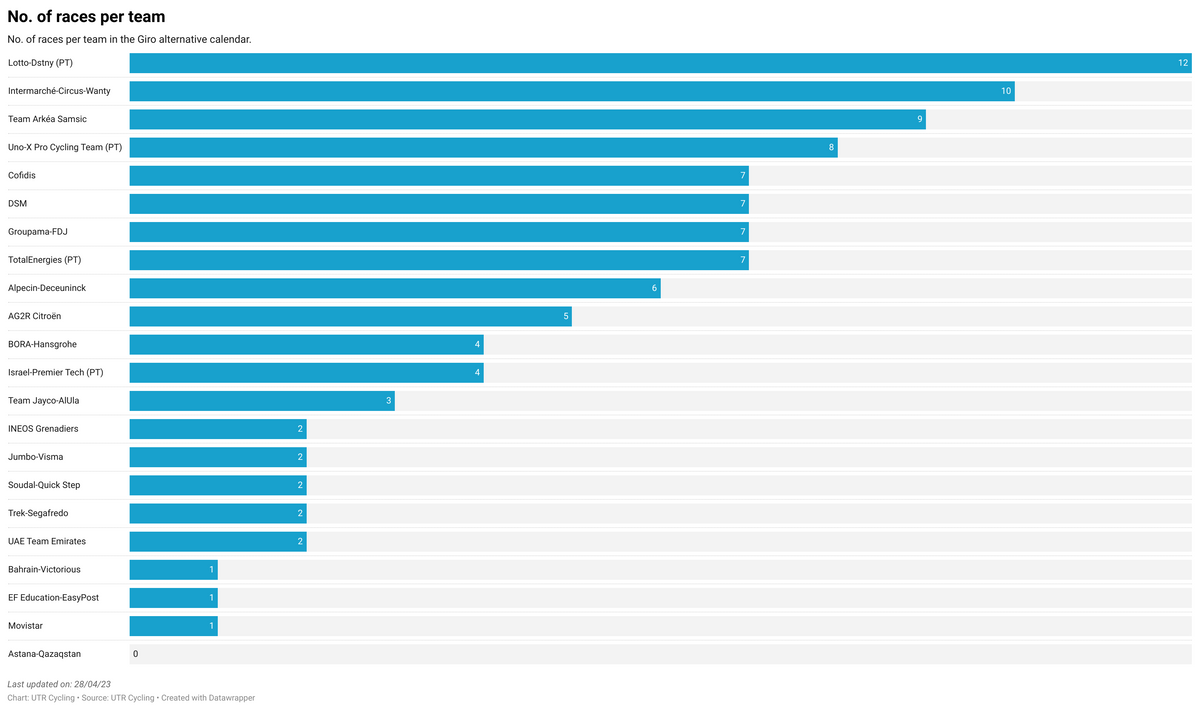The importance of the Giro Alternative Calendar

Whilst much of the cycling world focuses its attention on Italy each May, a quieter, but just as vital program will be taking place in the background. The 'Giro Alternative' calendar features sixteen races this year, including nine one day races, providing teams with a significant opportunity to gain ground on other teams who neglect it.
The significance of the Giro Alternative in the points race became apparent last year, as Lotto-Soudal gained ground on all their relegation rivals by registering for 1.1 races. With 125 points on offer for the winner, these races provided WorldTour teams with the opportunity to take more points than a Giro stage win (100) against weaker opposition. For example, Florian Vermeersch's victory at Antwerp Port Epic gained 125 points for Lotto, yet it came against only one other WorldTour team (Intermarché-Wanty -Gobert Matériaux) and Alpecin-Fenix. Such was the brilliance of Lotto's Giro Alternative calendar that they gained over five times as many points than at the Giro, averaging 124.25 points per race.
Continuing their tactics from 2022, Lotto-Dstny have registered for 75% of the Giro Alternative: the most out of our 22 analysed teams. As we look further down the UCI rankings, DSM, Arkéa Samsic, TotalEnergies and Uno-X have all registered for around 50%, meaning they have given their squads the opportunity to maintain or improve their position.
Most notably though, the two WorldTour teams in the provisional relegation zone - Astana Qazaqstan and Jayco-AlUla - have failed to register for enough races, meaning they risk falling further adrift unless they have exceptional Giro's. After a torrid start to the season, Astana cannot afford to fall further behind, particularly if they are looking for new sponsors or selling their license at the end of the season. Thus, to say Astana's failure to register for a single race is baffling is an understatement.
Likewise, any gains made by Jayco on Arkéa Samsic during the Giro are likely to be mitigated by their lack of participation in the Giro Alternative as, provisionally, they will participate in six less races than Arkéa, five less than Uno-X and four less than DSM and TotalEnergies. As we saw in the last cycle, teams can already be too far behind going into the final season, and by racing so little on the European Tour compared to their competitors, Jayco risk having too much to do in the final season. It is clear that Jayco have the quality within their roster, as over 75% of their points have been scored in WorldTour races. However, a lack of race days has dragged them into a relegation fight against teams who score the majority of their points in the ProSeries or Europe Tour. It will be interesting to see if their tactics change as we progress throughout the cycle.
Perhaps the most rewarding race for relegation-threatened teams is the Tour of Japan, where the quality of the provisional startlist is lower than on the Europe Tour and there are no WorldTour teams down to start. Undoubtedly, such a strategy would have to align with sponsor objectives since the cost of transporting riders, staff and equipment would be significant. In this respect, Jayco-AlUla appear to be the only WorldTour team with the potential for sponsor objectives to align, as the GreenEdge cycling outfit previously owned a development team in East Asia and has showed significant interest in aiding the development of cycling in countries where there is potential growth.
Another route to a points advantage for WorldTour teams may be to ask riders to compete with their national squads in races they are not allowed to compete in. Although they failed to retain their WorldTour license last cycle, Israel-Premier Tech used Itamar Einhorn effectively in an Alternative Giro and TDF calendar, including a victory at GP Wyszków and third place at Visegard Bicycle Race. In total, this alternative calendar picked up seventy points, averaging close to twelve points per race day.
Although this route will not pick up significant points, it may become increasingly useful for teams now that twenty riders contribute towards the points total, rather than ten. Therefore, teams could opt to send their lower scoring riders to smaller races with lesser quality, thereby maximising their opportunity to gain more points. Victory in 1.2 races, for instance, attains forty points, which is equivalent to coming 14th in a WorldTour one day race. Consequently, the points available for riders of lesser ability may be maximised by participating in such races where possible.
